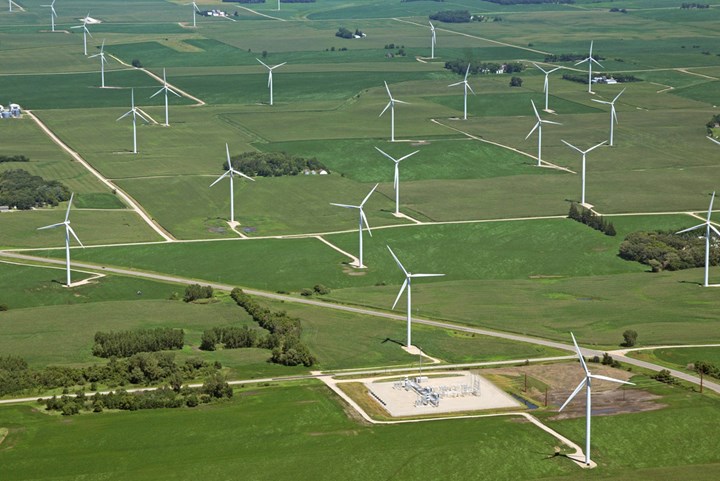Regen Fiber launches eco-friendly wind blade recycling process
Regen Fiber’s sustainable recycling process keeps wind blades out of landfills by converting them into raw materials for use in asphalt, composite products and more.
A new Cedar Rapids, Iowa business, Regen Fiber, owned by logistics solution company Travero, is launching an innovative way to recycle decommissioned wind turbine blades. Regen Fiber says it has created a patent-pending and eco-friendly process to convert these wind blades into reusable materials for manufacturers in the concrete and mortar industries, among others, without them ending up in landfills, or or releasing combustion byproducts, such as carbon, into the atmosphere if burned.
The primary end product is a top-performing reinforcement fiber that can increase the strength and overall durability of concrete and mortar applications such as pavement, slabs-on-grade and precast products. The company also produces microfibers and additives from wind blade components for use in a range of composite, concrete and soil stabilization applications.
According to the American Clean Power Association (Washington, D.C., U.S.), wind energy is the largest renewable energy source in the U.S. and “nearly 70,000 wind turbines across the country are generating clean, reliable power.”
Regen Fiber anticipates recycling more than 30,000 tons of shredded blade materials per year.
“With tremendous growth projected in the wind industry and an increasing number of turbines already reaching the end of their approximately 20-year lifespan, Regen Fiber is entering the market at the perfect time,” Jeff Woods, director of business development at Travero, says. “Recycling blades without using heat or chemicals while simultaneously keeping them out of landfills or being burned supports the sustainability goals of both the wind industry and customers receiving the recycled products.”
In 2021, Regen Fiber began piloting the process at a facility in Des Moines, Iowa. Working with customers in the concrete industry, Regen Fiber has been able to validate products’ performance and ensure the products meet customer requirements.
Large, commercial-scale operations for the recycling of decommissioned blades are expected to begin in the second half of 2023. A new manufacturing facility for Regen Fiber to recycle decommissioned blades is currently being constructed in Fairfax, Iowa, in a section of Alliant Energy’s Big Cedar Industrial Center, next to Travero’s Logistics Park Cedar Rapids.
Once commercial-scale operations in Fairfax reach full production levels, Regen Fiber anticipates recycling more than 30,000 tons of shredded blade materials per year.
In addition to recycling decommissioned blades, Regen Fiber says it is already recycling new wind turbine blade, manufacturing scrap materials at commercial scale at the Des Moines facility. These scrap materials are processed into fibers that can be used for asphalt and composite products, helping to solve another waste management issue that exists at the start of the wind turbine blade lifecycle.
Travero, along with its subsidiary Travero Logistics, supports Regen Fiber and its customers with all aspects related to the transportation of turbine blades and finished products across North America.
“Travero’s extensive experience and expertise in supply chain and logistics, production operations and material handling are bringing Regen Fiber’s new recycling process to life,” Woods adds. “We are proud to supply manufacturers with high-quality products that are made in the U.S. while helping to protect the environment for future generations.”
Related Content
-
RTM, dry braided fabric enable faster, cost-effective manufacture for hydrokinetic turbine components
Switching from prepreg to RTM led to significant time and cost savings for the manufacture of fiberglass struts and complex carbon fiber composite foils that power ORPC’s RivGen systems.
-
Composites end markets: Energy (2024)
Composites are used widely in oil/gas, wind and other renewable energy applications. Despite market challenges, growth potential and innovation for composites continue.
-
Recycling end-of-life composite parts: New methods, markets
From infrastructure solutions to consumer products, Polish recycler Anmet and Netherlands-based researchers are developing new methods for repurposing wind turbine blades and other composite parts.

















